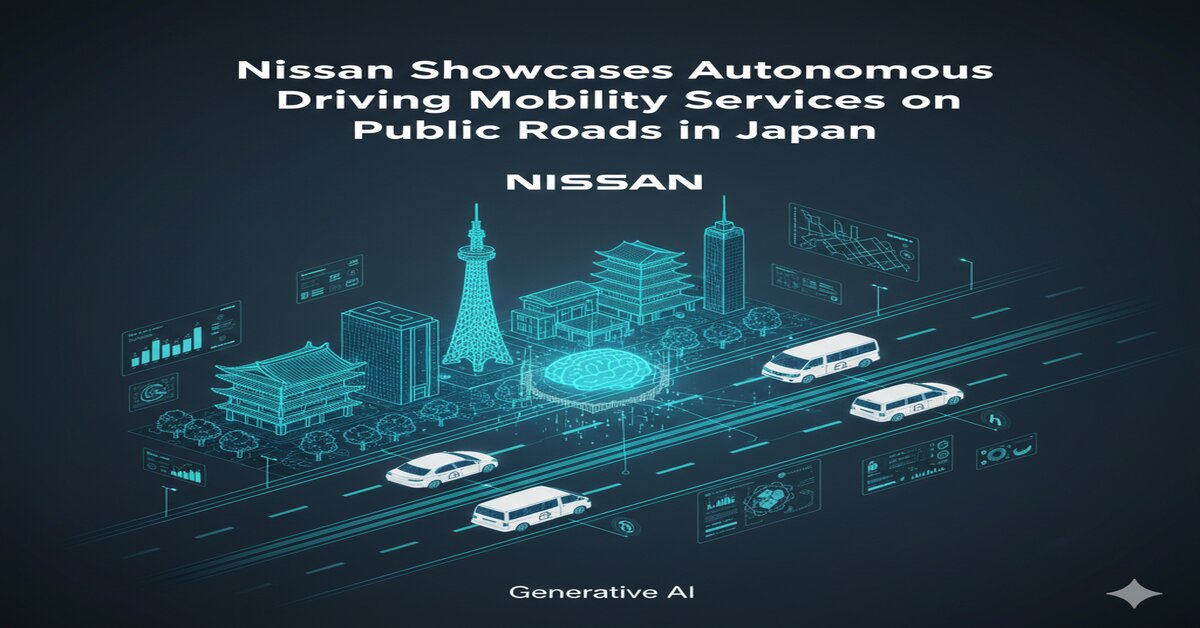Nissan has initiated demonstrations of a prototype vehicle outfitted with its proprietary autonomous driving technologies on public roads in Japan. This effort represents a significant milestone in Nissan’s journey towards launching autonomous mobility services by fiscal year 2027.
The prototype in question is a Nissan LEAF, which has been upgraded to include a sophisticated sensor suite. This suite comprises 14 cameras, 10 radars, and 6 LIDAR sensors, all working in tandem to provide comprehensive environmental awareness. This configuration marks a substantial improvement over earlier prototypes, particularly with the addition of an array of roof-mounted sensors. These sensors vastly increase the detection range and enhance the accuracy of surrounding environment detection.
The enhanced sensor suite has led to significant advancements in several key areas: recognition performance, behavioral prediction, judgment functions, and control systems. These improvements have resulted in smoother and more reliable operation across a variety of complex driving scenarios. For instance, the prototype LEAF has demonstrated its ability to predict pedestrian movements, execute lane changes when merging, and make safe judgments about entering intersections.
The demonstrations have been conducted on the streets of Yokohama, in proximity to Nissan’s global headquarters. Here, the prototype has shown remarkable proficiency in navigating urban environments, which is crucial for the deployment of autonomous vehicles in real-world settings.
Nissan’s ambitions extend beyond these initial tests. In the fourth quarter of this fiscal year, the company plans to initiate trials in the Minato Mirai area, aiming to move towards full service demonstration tests by fiscal year 2025. These trials are expected to further refine the technologies and operational protocols necessary for a broader rollout.
In a recent press release, Nissan articulated its long-term vision: “Nissan’s long-term vision is to empower mobility by solving transportation service issues faced by local communities. Local communities, particularly within Japan, have been facing several mobility challenges, such as driver shortages, which are a result of an ageing population. Supporting a resolution to this challenge, Nissan will provide a broad range of new services that enable free movement.”
This vision underscores Nissan’s commitment to addressing critical societal issues through innovative mobility solutions. In Japan, the aging population has led to a significant shortage of drivers, posing substantial challenges for transportation services. Nissan aims to tackle these issues head-on by developing autonomous driving technologies that can fill the gaps left by these shortages.
The successful deployment of autonomous mobility services could revolutionize transportation in many local communities, providing greater flexibility and freedom of movement for residents. This is particularly important in rural and suburban areas where traditional transportation services may be limited or non-existent.
By leveraging advanced autonomous driving technologies, Nissan hopes to not only enhance mobility but also improve the quality of life for many people. The company’s focus on safety, reliability, and user-friendliness in its autonomous systems is designed to build public trust and facilitate widespread adoption.
Nissan’s ongoing efforts in autonomous vehicle technology demonstrate its leadership and commitment to innovation in the automotive industry. As these technologies continue to evolve, the potential benefits for society are immense, promising a future where autonomous vehicles play a key role in everyday transportation.







